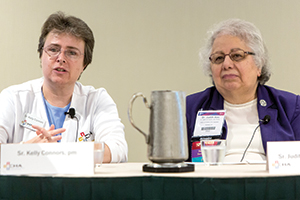By BETSY TAYLOR
NEW ORLEANS — In about two dozen cases around the United States, Catholic hospitals that have been sold to non-Catholic owners have maintained their Catholic identity without having a traditional sponsorship relationship. Panelists at the Catholic Health Assembly here outlined how that is possible.

Sr. Kelly Connors, pm, left, and Sr. Judith Ann Karam, CSA, describe how some Catholic hospitals sold to non-Catholic owners have maintained their Catholic identity without a traditional sponsor relationship. Sr. Connors is CHA’s senior director of sponsor services and Sr. Karam is the congregational leader of the Sisters of Charity of St. Augustine and chair of CSA Health System Ministries, the public juridic person of Sisters of Charity Health System.
Photo by Jerry Naunheim Jr./© CHA
Lisa Gilden, CHA's vice president and general counsel, said there are 41 Catholic hospitals in the United States that have been transferred to other-than-Catholic systems and have maintained their Catholic identity after the sale. Of these, 22 are not sponsored by a public juridic person or a religious congregation. Instead, they retain their Catholic identity through a contractual arrangement that outlines the ongoing faith-related commitments that the hospital will adhere to in order to remain recognized by their bishop as a Catholic ministry.
Gilden said the contracts are often between the new non-Catholic owner and the bishop in the diocese where the hospital is located. Sr. Judith Ann Karam, congregational leader of the Sisters of Charity of St. Augustine in Richfield, Ohio, and chair of CSA Health System Ministries, the public juridic person of the Sisters of Charity Health System, said when the Sisters of Charity Health System transferred three of its hospitals to other-than-Catholic owners, definitive agreements related to Catholic identity were signed between the Sisters of Charity Health System and the new hospital owners, with the bishop in each diocese affirming the transaction.
The hospitals' legacy sponsors usually are actively involved in assisting the parties in developing the essential requirements of Catholic identity. The list begins with adherence to the Ethical and Religious Directives for Catholic Health Care Services. In most cases, other obligations are specified, including the appointment by the bishop and the legacy sponsors of some hospital leadership moving forward, whether it's one member each to the hospital's mission and values committee, or the appointment of a member to the board of trustees; the approval of a senior mission leader; the maintenance of a robust pastoral care department and the same levels of charity care or community benefit as before the sale.
Other elements relate to the provision of sacramental care of the sick, including Mass; the ongoing religious formation of hospital leadership and employees in the ministry; and the public display of religious symbols. Catholic social teaching as it relates to a just workplace and community benefit is paramount in care of employees, Sr. Karam said.
Sr. Karam explained how the Sisters of Charity Health System in Cleveland worked to ensure the Catholic identity of three hospitals would be maintained after transfer to other-than-Catholic buyers in 2015.
She said definitive agreements were carefully crafted to thoroughly detail how the hospitals' Catholic identity will be lived out. The agreements include procedures for addressing and resolving concerns. The definitive agreements result in the accountability structure for Catholic identity to sustain this into the future, Sr. Karam said.
Providence Health in Columbia, S.C., is comprised of two hospitals sold by the Sisters of Charity Health System to LifePoint Health of Brentwood, Tenn., a for profit, other-than-Catholic company. The Sisters of Charity Health System continues to provide mission and ministry services to Providence Health, including the services of a vice president of mission and ministry. Panelist Joan Bumpus holds that job.
Bumpus said she has developed written criteria to evaluate the mission competency of Providence Health leadership, which can be used as part of an individual's periodic job reviews. She said these documents also are intended to be used as an ongoing teaching tool.
Robert David is president of UH St. John Medical Center in Westlake, Ohio. In 2015, University Hospitals in Cleveland became full owners of UH St. John Medical Center in Westlake, Ohio, which University Hospitals had previously co-owned in a joint venture with the Sisters of Charity Health System since 1999. David said that while the agreements are in place to ensure the Catholicity, the sisters created a lasting culture of deep caring at the hospital that remains.
Sr. Kelly Connors, pm, CHA's senior director of sponsor services, encouraged those with questions about sponsorship and Catholic identity to reach out to CHA. "CHA is interested in (assisting with) questions that are of interest to you," she said. She also cited the May-June 2017 Health Progress as a good source of information on sponsorship.
Copyright © 2017 by the Catholic Health Association
of the United States
For reprint permission, contact Betty Crosby or call (314) 253-3490.